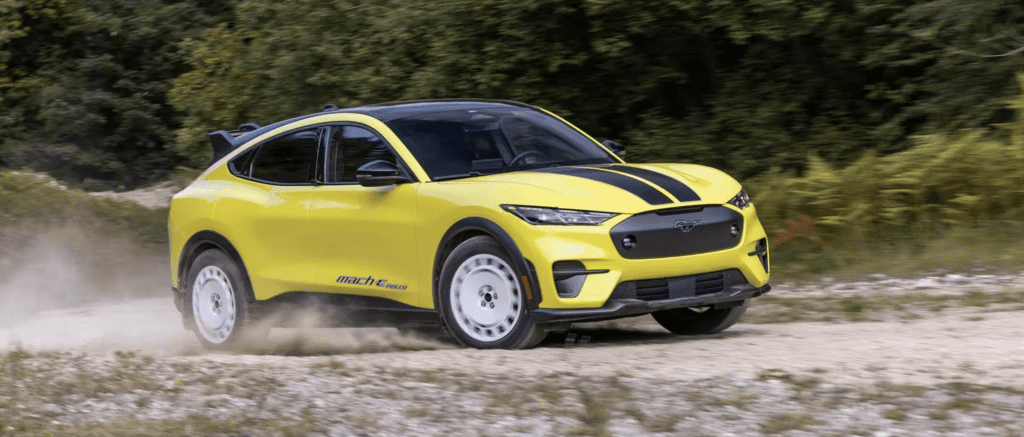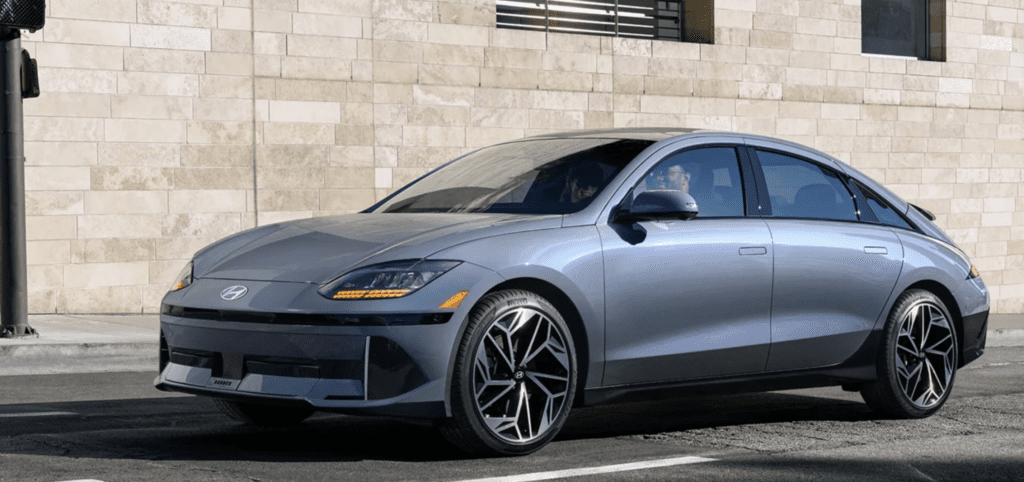Down the Road: Shopping for Electric Cars

Audio By Carbonatix

Substantial incentives are being offered by Hyundai for electric vehicles. Courtesy of Hyundai USA
West Hartford resident John Lyons is an avid car enthusiast and collector. He has consulted in the car industry for nearly two decades and follows the industry and trends closely. He has written for Car Collector, Sports Car Market, Old Cars Weekly, and written auction catalog descriptions for cars with values up to the seven figures that have been published by numerous auction houses. His consulting practice works with estates to assist in selling cars no longer needed by the families.

Ford has lots of electric cars, like this Mustang sitting on lots. Courtesy of Ford Motor Company
By John Lyons
Electric cars have been in the news a ton these days for two reasons that I am going to write about in this edition of “Down the Road”; the first is political and the second is related to conditions in the market if shopping for an electric car.
There had been talk of mandating the elimination of sales of gasoline powered cars in Connecticut (and other states) with deadlines in the range of 2035 or a little over 10 years from now. I have a lot of thoughts on this topic, and I point out that I am a big proponent of electric cars. I owned a Tesla Model S for several years and absolutely loved it but I don’t think mandating all cars being electric by 2035 is the answer.
I have issues with forced mandates in general as I think it can create bad behavior by those it is foisted on. Last decade, VW/Audi had to pay billions to settle claims for misrepresenting fuel mileage and emissions compliance claims in some of their diesel vehicles. At least two other major manufacturers likely also falsified emissions and mileage claims on diesels – although I am not aware of any admission of wrongdoing by the others, so I am leaving their names out of this story.
While there were other contributing factors, these actions occurred because of mandated clean air performance as well as what are known as CAFE standards (Corporate Average Fuel Economy) which required certain MPG across all models of cars sold by a manufacturer. The new clean air standards caused a slight decrease in fuel mileage in VW’s diesel cars (at a time when demand for diesel cars was very high) so they did things that made the data that the EPA was studying appear to comply on both fronts when only the MPG requirement was being met and the clean air standard wasn’t. When VW recalled the cars after settling the case, and retrofitted the cars to comply with both standards, diesel car owners noticed a slight decrease in fuel mileage. The cars were, by then, used cars so the CAFE requirement was not impacted. I drove a VW Jetta diesel at the time and noted about a 6% decrease in fuel economy.

Substantial incentives are being offered by Hyundai for electric vehicles. Courtesy of Hyundai USA
Government regulation has to come slowly and in lockstep with the available technology, research, and development. With electric cars, there are lots of potential areas for problems. From an owner’s standpoint, there must be ample charging capacity both with station availability and production of enough electrical power to handle the additional demand. Neither exist today and there are no assurances they could exist by 2035 without heavy investment, possibly as much as half a trillion dollars nationally.
Compatible chargers need to be widely available which is why I think there should be government action on creating a standard that all cars use. Right now, there are several different charging standards (a few carmakers are working together at this point to standardize). Just as your power outlet for your TV is identical to your neighbor’s, charging ports need to be standardized across the industry.
A second concern with rushing mandatory electric-only cars is the ability to produce the batteries. Production is limited by how much and where the raw materials reside and unless production becomes cheaper and easier, without subsidies, electric cars will a struggle to sell to large segments of the buying public.
Range is a part of this equation as well. Until electric cars have reliable ranges in excess of 400 miles in varying conditions, there will be anxiety on the part of buyers. My Tesla had an official range of about 320 miles but driving at higher speeds, with heat, A/C, radio on, etc., shortened the range nearly 25%.
California had to ask folks to not charge their electric vehicles at one point during a heat spell because of the grid being unable to handle the new demand. We need to have the capacity in place if we are going to tell drivers to only drive electric.
I’d want to know about safe battery disposal/recycling prior to any mandates to go all electric. If we are going to care about our planet in producing and driving low/no emission cars, we need to make sure we aren’t destroying the planet by having no plan to safely recycle or reuse these batteries.
Last point: please avoid being sucked into a political position based on your party affiliation or where you watch your news. The above arguments are the real issues and anyone saying otherwise is probably misinformed and might be doing so for financial gain only. Again, while I love electric cars, mandating the elimination of gasoline- and diesel-powered cars is premature.
Right now, we are seeing a glut in electric cars. Production is easily meeting demand and, in many cases (outside of Tesla), far exceeding demand. Some of this is due to many of the issues I discussed earlier. Range anxiety is real and fear of being unable to charge is another big reason. In some communities, the cost of charging exceeds the price of gasoline on a cost per mile basis. As a result, electric cars are sitting on dealer lots being discounted.
I recently visited a local VW dealer I am friendly with, and they had several ID4s on the lot even with factory, dealer, and financing incentives offered on them. They also were quick to point out that federal tax credits were in effect with the net saving being in some cases, well over $10,000 on a sub-$50,000 car. Hyundai is also having the same issues.
I recently meet with a dealer GM for a Hyundai store and they too are offering substantial incentives (both factory and dealer) as well as federal tax incentives. Ford too, has lots of electrics sitting on lots and cars that leased for well over $600 monthly just 18 months ago are now leasing for well under $400 monthly (plus the tax incentive).
It is a really good time to buy or lease an electric car if your driving habits permit and you are so inclined.
Over the next few months, I’ll try to provide a few suggestions beyond these if you are considering going electric. One suggestion in the meantime: if you need to rent a car, try to rent an electric car. It’s an opportunity to use the car for a period of time and understand if it is a good fit for you.
I’ll see you down the road!
West Hartford resident John Lyons (Follow John Lyons on X @hartfordland) writes a monthly column published by West Hartford LIFE reviewing cars and talking about the industry. He will also provide tips for those purchasing a car to help readers get the best deal.
A version of this column appeared in the February 2024 issue of West Hartford LIFE.
Like what you see here? Click here to subscribe to We-Ha’s newsletter so you’ll always be in the know about what’s happening in West Hartford! Click the blue button below to become a supporter of We-Ha.com and our efforts to continue producing quality journalism.




[…] Don’t miss the most recent edition of our car column, Down the Road! Click here. […]